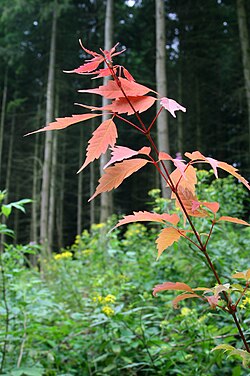| Habit | tree
| |
|---|---|---|
| Height: | ⇕ | 30 ft"ft" can not be assigned to a declared number type with value 30. |
| Width: | ⇔ | 35 ft"ft" can not be assigned to a declared number type with value 35. |
| Lifespan: | ⌛ | perennial |
| Bloom: | ❀ | early spring, mid spring, late spring |
| Exposure: | ☼ | sun |
|---|---|---|
| Features: | ✓ | flowers |
| USDA Zones: | 5 to 8 |
|
Acer > |
Acer cissifolium (Vine-leafed Maple, Vineleaf Maple, and variations thereof) is a maple native to Japan, from southern Hokkaidō south through Honshū and Shikoku to Kyūshū.[1]
It is a deciduous small tree or large shrub growing to 5–10 m (rarely 15 m) in height, with smooth grey bark. The young shoots are green, often tinged pink, hairy at first with whitish hairs, becoming grey in the second year. The leaves are trifoliate, with a very slender red petiole up to 10 cm long; the three leaflets are 4–10 cm long and 2–4 cm broad, with 1–2 cm petiolules, and coarsely serrated margins. They are matt green above, paler and slightly shiny below, and turn pale yellow to pinkish in autumn. The flowers are produced in pendulous racemes 10–16 cm long, each flower with four sepals and petals; it is dioecious with male and female flowers on separate trees. The fruit is a paired samara, the nutlets are 7 mm long, the wings 15–25 mm long, spreading at an acute angle.[1][2][3][4]
Both the scientific and English names refer to the resemblance of its leaves to those of Cissus, a genus in the vine family.[3]
This maple is common in cultivation although few cultivars are known. A variegated cultivar 'Gotenbanishiki' has been selected in Japan.[5] Female trees are often propagated by layering and sold in the nursery trade.[2]
A. cissifolium is similar to its closest relative A. henryi (rare in cultivation) and its close relative A. negundo (common in cultivation with many cultivars). It may be distinguished from the former by its shoots turning grey in their second year (remaining green for several years in A. henryi), and from the latter by its consistently trifoliate leaves, never with the five leaflets common in A. negundo.[3] Mislabeling occurs between these three species.[2]
Read about Acer cissifolium in the Standard Cyclopedia of Horticulture
|
|---|
|
Acer cissifolium, Koch (Negundo cissifolium, Sieb. & Zucc. Crula cissifolia, Nieuwl.). Small tree: lfts. 3, stalked, ovate or elliptic, acuminate, coarsely serrate, sparingly ciliate, 2-3 1/2in. long, light green beneath and glabrous, or nearly so: racemes slender, many-fld., pubescent; pedicels less than 1/4in. long; sepals and petals 4, small: fr. in pendulous racemes; wings slightly spreading. Japan. S.I.F. 2:41.—-Handsome, round-headed tree, with slender, spreading branches and graceful bright green foliage, turning orange-yellow and scarlet in autumn; hardy at the Arnold Arboretum. CH
|
Cultivation
- Do you have cultivation info on this plant? Edit this section!
Propagation
- Do you have propagation info on this plant? Edit this section!
Pests and diseases
- Do you have pest and disease info on this plant? Edit this section!
Species
Gallery
If you have a photo of this plant, please upload it! Plus, there may be other photos available for you to add.
References
- Standard Cyclopedia of Horticulture, by L. H. Bailey, MacMillan Co., 1963
External links
- w:Acer cissifolium. Some of the material on this page may be from Wikipedia, under the Creative Commons license.
- Acer cissifolium QR Code (Size 50, 100, 200, 500)
- ↑ 1.0 1.1 Yamaguchi prefecture ecology: Acer cissifolium (in Japanese; google translation)
- ↑ 2.0 2.1 2.2 van Gelderen, C. J. & van Gelderen, D. M. (1999). Maples for Gardens: A Color Encyclopedia.
- ↑ 3.0 3.1 3.2 Rushforth, K. (1999). Trees of Britain and Europe. Collins ISBN 0-00-220013-9.
- ↑ Mitchell, A. F. (1982). The Trees of Britain and Northern Europe. Collins ISBN 0-00-219037-0
- ↑ Ganshukutei Botanic Garden: Acer cissifolium 'Gotenbanishiki' (in Japanese; google translation)

